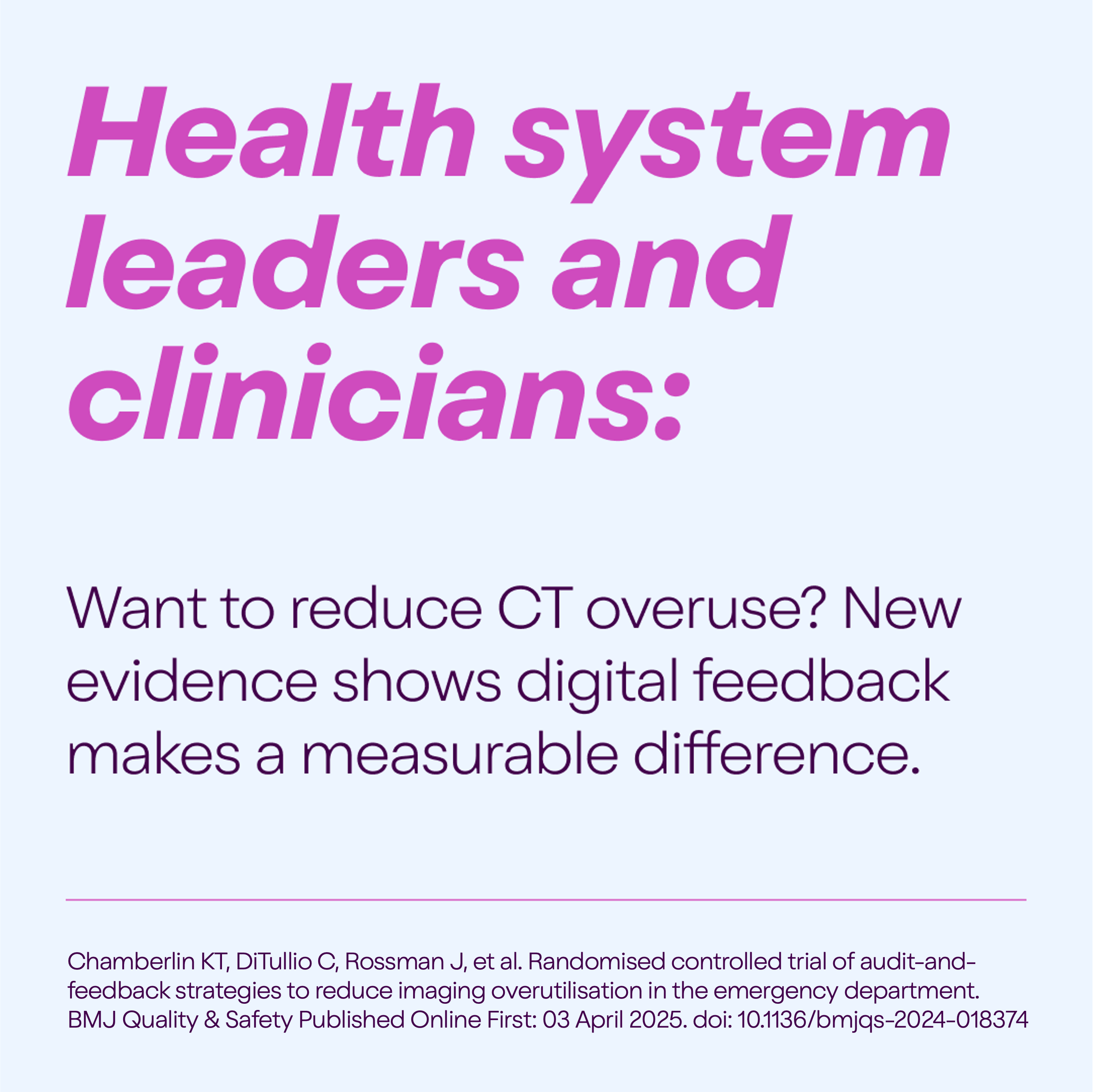Editor's Pick: New Study Shows Feedback Lowers Overuse of CT Imaging
“Randomised controlled trial of audit-and-feedback strategies to reduce imaging overutilisation in the emergency department”
Karl T Chamberlin, Christopher DiTullio, Jennifer Rossman, Bruce A Barton, Martin Reznek, & Kevin Kotkowski
BMJ Quality & Safety (BMJ Qual Saf)
April 3, 2025
What's the point?
Clinicians can overuse diagnostic tests, potentially leading to overdiagnosis and unnecessary risks for patients. This randomized controlled trial looked at whether using audit-and-feedback strategies with emergency department (ED) clinicians could help reduce unnecessary scans. At five hospital EDs, 78 doctors were split into three groups: digital feedback, a mix of digital and in-person feedback, and no feedback at all. After three rounds of feedback, clinicians in the digital feedback group ordered significantly fewer CT studies compared to the no feedback group, while the hybrid group ordered fewer CT studies but not significantly less than the no feedback group.
The takeaway? Giving ED clinicians feedback on their test-ordering practices led to fewer unnecessary CT scans for patients with low risk of spinal injury.
The Bottom Line: A digital audit-and-feedback system can help clinicians make safer, more appropriate choices about testing.
Why does this matter?
In primary care, getting the right diagnosis isn’t just up to the doctor; it’s a team Diagnostic excellence is usually framed as a problem of underdiagnosis (i.e., missed or delayed diagnoses), but overdiagnosis and overuse of diagnostic testing can harm patients too. For example, overusing CT scans can expose patients to unnecessary radiation, which may increase cancer risk. This study shows that simply giving doctors feedback, especially through email or other digital tools, can help reduce unnecessary CT scans in the ED. Because digital feedback is quicker and easier to deliver than in-person meetings, this approach could be a practical way to improve diagnostic excellence at an individual clinician level and at the healthcare system level.
Who does this impact?
Health system leaders and administrators can cite this study to support using digital feedback tools to curb unnecessary imaging. It shows that even low-effort strategies like email feedback can meaningfully reduce CT scan overuse and lower patients’ exposure to potentially harmful radiation.
For medical educators, the findings highlight a need for stronger education around evidence-based decision tools in the ED. Some clinicians may not fully trust or use these tools, even when they’re proven effective, pointing to a gap in training and confidence.
For healthcare professionals, particularly in emergency medicine, this study suggests that actively seeking feedback can help improve decision-making and reduce medicolegal anxiety around under-testing. Data-driven feedback can be a valuable tool in balancing thorough care with appropriate testing.
Patients can take away that, while missed diagnoses are a real concern, this study is a reminder that too much testing can also be risky. Overuse of CT scans can expose patients to unnecessary radiation, so it’s important to ask questions and understand when a test may not be needed.
Join the Conversation
We’d love to hear your take—join the conversation with us on LinkedIn or Bluesky and share your thoughts!
About Editor's Picks
Curated by the UCSF CODEX team, each Editor’s Pick features a standout study or article that moves the conversation on diagnostic excellence forward. These pieces offer meaningful, patient-centered insights, use innovative approaches, and speak to the needs of patients, clinicians, researchers, and decision-makers alike. All are selected from respected journals or outlets for their rigor and real-world relevance.
